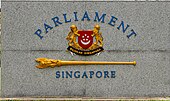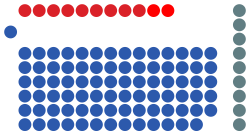新加坡国会
| 新加坡国会 Parliament of Singapore | |
|---|---|
| 第14届国会 | |
 | |
| 种类 | |
| 种类 | |
| 领导 | |
副议长 | |
副议长 | |
| 结构 | |
| 议员 | 民选议员93人 非选区议员2人 官委议员9人 |
 | |
政党 | |
| 选举 | |
| 采用领先者当选方式 | |
上届选举 | 2020年7月10日 |
下届选举 | 2025年或之前 |
| 会议地点 | |
 | |
| 新加坡国会大厦 | |
| 网址 | |
| www.parliament.gov.sg | |
新加坡国会(英语:Parliament of Singapore;马来语:Parlimen Singapura),组织结构沿用西敏制,与新加坡总统共同组成新加坡的立法机构。新加坡国会属一院制,由民选国会议员、非选区议员及官委议员组成。2020年大选过后,共选出93席民选议员及2席非选区议员,加上9席官委议员组成第14届国会,开议日期为8月24日。
成员
[编辑]新加坡国会属一院制,所有国会议员皆归属于单一议院,无上下议院设置。2010年4月26日,《新加坡宪法》修宪后[1],依据宪法与相关法规规定,最高可以有105席议员,其中93席为民选议员,可任命最多12席非选区议员[2]以及最多9席官委议员[3]。2020年大选过后,共选出93席议员[4],并可任命(或依据《国会选举法》宣告当选[5])2席非选区议员[6]。
民选议员
[编辑]截至2020年大选,依据大选需要,将新加坡全国分成31个选区[7][8],其名称与边界划分由新加坡总理指定并刊登公报[9];其中14个选区为单选区,17个选区为集选区。集选区于1991年引入,以确保在国会中有马来籍、印度籍与其他少数族群的代表[10]。在集选区当中,所有候选人必须以同一政党或全为独立候选人组成参选团队[11],其中至少一位必须属于马来、印度或少数族群社群[12]。新加坡总统依据内阁指示,可宣告哪些选区为集选区及其人数(3至6人),以及该集选区的少数族群代表为马来、印度或其他族群[13]。不论何时,必须至少有8个选区为非集选区[14],并且集选区的议员人数不得少于当届大选所有改选议员席次的四分之一[15]。
每一选区可选1席议员(单选区)或由总统指定席次之团队(集选区)进入国会服务[16]。目前各集选区席次介于4至6席[17][18],也就是说,单选区得票最高的候选人,以及集选区中得票最高的4至6名(人数依各集选区规定)参选人团队才能入国会。目前单选区可产生12名议员,集选区则为75名。所有议员选举采用领先者当选机制[19],且单一候选人不能同时担任两个选区以上的候选人[20]。
委任议员
[编辑]非选区议员
[编辑]非选区议员于1984年引入,确保国会中有不属于执政党的最少席次反对党议员[21]。2020年7月10日起,宪法规定非选区议员席次最多为12席减去反对党当选席次[22]。依据2020年大选结果,反对党共赢得10席议员,因此依法可宣告当选2席非选区议员,该席次由代表新加坡前进党参选西海岸集选区的梁文辉与潘群勤获得[23][24]。
官委议员
[编辑]1990年,《新加坡宪法》经修正,可任命最多9席官委议员[25]。这项修正是因为当时认为在国会的两个反对党无法充分表达国会外部的重要另类观点,并且能让还没准备好经营地方选区及参选议员的新加坡公民,借此提升国会实务经验[26]。
议长
[编辑]议长总体负责管理议会及其秘书处,其正式职责为主持会议[27]、辩论,并根据议会标准规范做出决定,以利进行议会事务。议长不参与辩论,但如果为国会议员,则能反对议案或表态弃权。议长也以国会代表经营对外关系,并在国事活动或海外访问中作为国会的对外象征[28]。
议长必须在每次大选后的第一次国会会议上选出,之后才能进行其他工作。如果议长因为解散国会以外的事由而出缺,则必须先补选议长,才能进行其他工作[29]。议长通常由不担任阁员或国会秘书长的议员中选出,但有可能选出非议员身份的人。即便如此,非议员的候选人必须具备可被选为议员的资格[30]。议长的薪资在其任期当中不得削减[31]。
议长可在任何时候向国会职员书面提交辞职声明。议长在以下三种情况会自动离职:
- 国会大选过后的第一次会议;
- 议长为议员,且因为解散国会以外的原因而不再担任议员,或是担任阁员或国会秘书长;
- 议长不是议员,且不再是新加坡公民或依据宪法第45条失去资格[32]。
历届国会组成
[编辑]超级多数党 多数党 相对多数党 最大反对党
| 届次 (选举) |
补选 | 组成 (任期开始时) |
议长 | 总理 | 反对党领袖 | 行动党 | 工人党 | 民主党 | 人民党 | 民联 | 前进党 | 社阵 | 联民党 |
|---|---|---|---|---|---|---|---|---|---|---|---|---|---|
| 1 (1963年) |
1965年 1966年 1967年 |
14:37
|
E·W·巴克(1963-64年) A·P·拉贾 (1964-66年) 库马拉斯瓦米(1966-68年) |
李光耀 (人民行动党) |
不适用 | 37↓ 38↓ 44↓ 49 |
- | - | - | - | - | 13↓ 6↓ 2 |
1↓ 0 |
| 2 (1968年) |
1970年 | 0:58
|
库马拉斯瓦米(1968-70年) 杨锦成(1970-72年) |
李光耀 (人民行动党) |
58 | - | - | - | - | - | - | - | |
| 3 (1972年) |
不适用 | 0:65
|
杨锦成 | 李光耀 (人民行动党) |
65 | - | - | - | - | - | - | - | |
| 4 (1976年) |
1977年 1979年 |
0:69
|
杨锦成 | 李光耀 (人民行动党) |
69 | - | - | - | - | - | - | - | |
| 5 (1980年) |
1981年 | 0:75
|
杨锦成 | 李光耀 (人民行动党) |
惹耶勒南 (工人党) |
75↓ 74 |
0↓ 1 |
- | - | - | - | - | - |
| 6 (1984年) |
不适用 | 2:11
|
杨锦成 | 李光耀 (人民行动党) |
惹耶勒南(1984-86年) (工人党) 詹时中(1986-88年) (民主党) |
77 | 1↓ 0 |
1↓ 0 |
- | - | - | - | - |
| 7 (1988年) |
不适用 | 2:1:80
|
杨锦成(1988-89年) 陈树群(1989-91年) |
李光耀(1988-90年) (人民行动党) 吴作栋(1990-91年) (人民行动党) |
詹时中 (民主党) |
80 | 2 非选区 | 1 | - | - | - | - | - |
| 8 (1991年) |
1992年 | 0:4:77
|
陈树群 | 吴作栋 (人民行动党) |
詹时中(1991-93年) (民主党) 林孝谆(1993-97年) (民主党) |
77 | 1 | 3 | - | - | - | - | - |
| 9 (1997年) |
不适用 | 1:2:81
|
陈树群 | 吴作栋 (人民行动党) |
詹时中 (人民党) |
81 | 1 1 非选区 |
- | 1 | - | - | - | - |
| 10 (2001年) |
不适用 | 1:2:82
|
陈树群(2001-02年) 阿都拉·塔姆基(2002-06年) |
吴作栋(2001-04年) (人民行动党) 李显龙(2004-06年) (人民行动党) |
詹时中 (民联) |
82 | 1 | - | - | 1 1 非选区 |
- | - | - |
| 11 (2006年) |
不适用 | 1:2:82
|
阿都拉·塔姆基 | 李显龙 (人民行动党) |
刘程强 (工人党) |
82 | 1 1 非选区 |
- | - | 1 | - | - | - |
| 12 (2011年) |
2012年 2013年 |
3:6:81
|
迈克·柏默(2011-12年) 张有福(2012-13年代理) 哈莉玛·雅各布(2013-15年) |
李显龙 (人民行动党) |
刘程强 (工人党) |
81↓ 80 |
6↓ 7 2 非选区 |
- | 1 非选区 | - | - | - | - |
| 13 (2015年) |
2016年 | 3:6:83
|
哈莉玛·雅各布(2015-17年) 张有福(2017年代理) 陈川仁(2017-20年) |
李显龙 (人民行动党) |
刘程强(2015-18年) (工人党) 毕丹星(2018-20年) (工人党) |
83↓ 82 |
6 3 非选区 |
- | - | - | - | - | - |
| 14 (2020年) |
不适用 | 2:10:83
|
陈川仁(2020-23年) 陈舜娘(2023年代理) 谢健平(2023年-) |
李显龙 (人民行动党) |
毕丹星 (工人党) |
83↓ 82 80 |
10↓ 9↓ 8 |
- | - | - | 2 非选区 | - | - |
参见
[编辑]参考文献
[编辑]- ^ Jeremy Au Yong, Constitutional amendments passed: NCMP quota goes from six to nine; NMP scheme now permanent, The Straits Times, 2010-04-27: 1; Leong Wee Keat, Constitution debate draws lively exchange: Changes to NCMP scheme to allow for more opposition voices, says DPM Wong, Today, 2010-04-27: 1–2, (原始内容存档于2011-06-22). See also Rachel Chang, Concerns over plan to increase opposition presence, The Straits Times, 2010-04-27: B4.
- ^ Constitution of the Republic of Singapore (1999 Reprint), Art. 39(1)(b).
- ^ Constitution, Art. 39(1)(c).
- ^ hermes. GE2020: PAP wins 83 of 93 seats; WP takes two GRCs. The Straits Times. 2020-07-11 [2020-07-12]. (原始内容存档于2021-02-07) (英语).
- ^ Parliamentary Elections Act (Cap. 218, 2007 Rev. Ed.) ("PEA"), s. 52.
- ^ hermesauto. GE2020: Two PSP candidates from West Coast GRC team to be offered NCMP seats. The Straits Times. 2020-07-11 [2020-07-12]. (原始内容存档于2020-07-10) (英语).
- ^ Parliamentary Elections (Names and Polling Districts of Electoral Divisions) Notification 2011 (S 85/2011) dated 24 February 2011, para. 2 and Sch., made pursuant to the PEA, ss. 8 and 20A. The Constitution, Art. 39(3), states: "In this Article and in Articles 39A and 47, a constituency shall be construed as an electoral division for the purposes of Parliamentary elections."
- ^ ELD | Electoral Divisions. www.eld.gov.sg. [2020-07-12]. (原始内容存档于2020-07-12).
- ^ ELD | Gazettes. www.eld.gov.sg. [2020-07-12]. (原始内容存档于2021-02-07).
- ^ PEA, s. 8A(1).
- ^ Constitution, Art. 39A(2)(c).
- ^ Constitution, Art. 39A(2)(a).
- ^ PEA, ss. 8A(1)(a) and (b).
- ^ PEA, s. 8A(1A).
- ^ PEA, s. 8A(2).
- ^ PEA, s. 22.
- ^ Types of electoral divisions, Elections Department, 2009-04-09 [2009-07-01], (原始内容存档于2009-03-17).
- ^ Parliamentary Elections (Declaration of Group Representation Constituencies) Order 2011 (S 86/2011) dated 24 February 2011.
- ^ See, for instance, the PEA, s. 49(7E)(a): "... the Returning Officer shall declare the candidate or (as the case may be) group of candidates to whom the greatest number of votes is given to be elected".
- ^ Constitution, Art. 47.
- ^ Constitution, Art. 39(1)(b); Helena H[ui-]M[eng] Chan, The Legislature, The Legal System of Singapore, Singapore: Butterworths Asia: 30–40 at 31, 1995, ISBN 978-0-409-99789-7.
- ^ hermesauto. PM Lee Hsien Loong: NCMPs to get equal voting rights as MPs; opposition MPs to increase from 9 to 12 next GE. The Straits Times. 2016-01-27 [2020-07-12]. (原始内容存档于2020-06-27) (英语).
- ^ Jalelah Abu Baker, GE2020: PSP's Hazel Poa and Leong Mun Wai will take up NCMP seats, CNA, 14 July 2020 [14 July 2020], (原始内容存档于2020-07-14).
- ^ Low Youjin; Navene Elangovan; Wong Pei Ting, GE2020: 2 NCMP seats to be offered to PSP's West Coast GRC team, Today, 13 July 2020 [13 July 2020], (原始内容存档于2020-07-11). Tan Cheng Bock, the Secretary-General of the Progress Singapore Party, was also a member of the team that contested in West Coast GRC during the election, but he said he would not take up any NCMP seat.
- ^ Constitution, Art. 39(1)(c); Chan, The Legal System of Singapore, p. 32.
- ^ Goh Chok Tong (第一位副总理及国防部长), speech during the Second Reading of the Constitution of the Republic of Singapore (Amendment No. 2) Bill, Singapore Parliamentary Debates, Official Report (1989-11-29), vol. 54, cols. 698–699: Chan, The Legal System of Singapore, p. 32.
- ^ Constitution, Art. 54.
- ^ Speaker of Parliament, Parliament of Singapore, 2006-11-24 [2009-09-29], (原始内容存档于2008-05-08).
- ^ Constitution, Art. 40(1).
- ^ Constitution, Art. 40(2).
- ^ Constitution, Art. 41.
- ^ Constitution, Arts. 46(2)(a) and (e).


